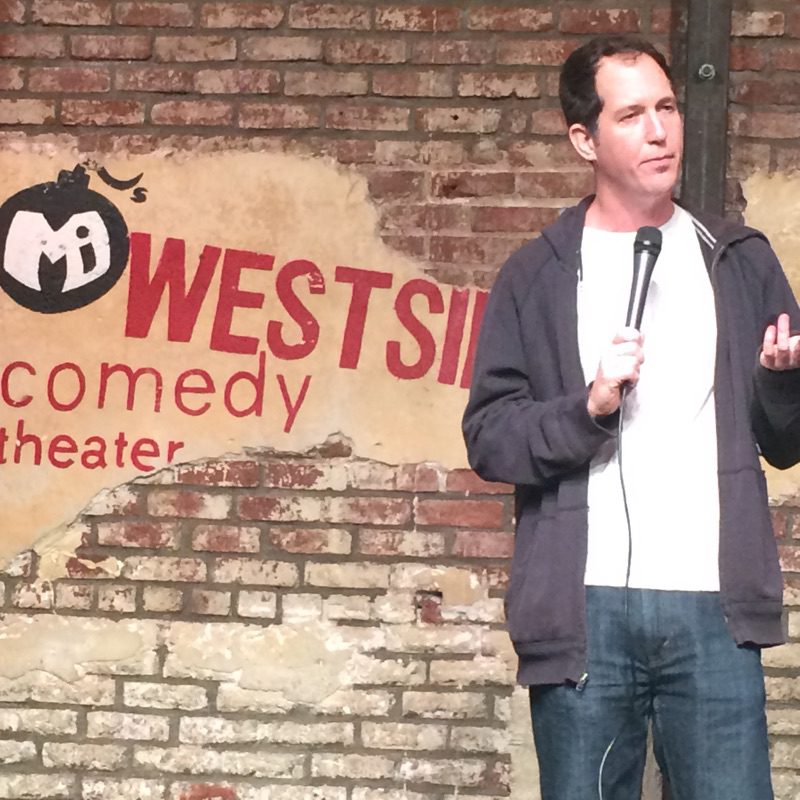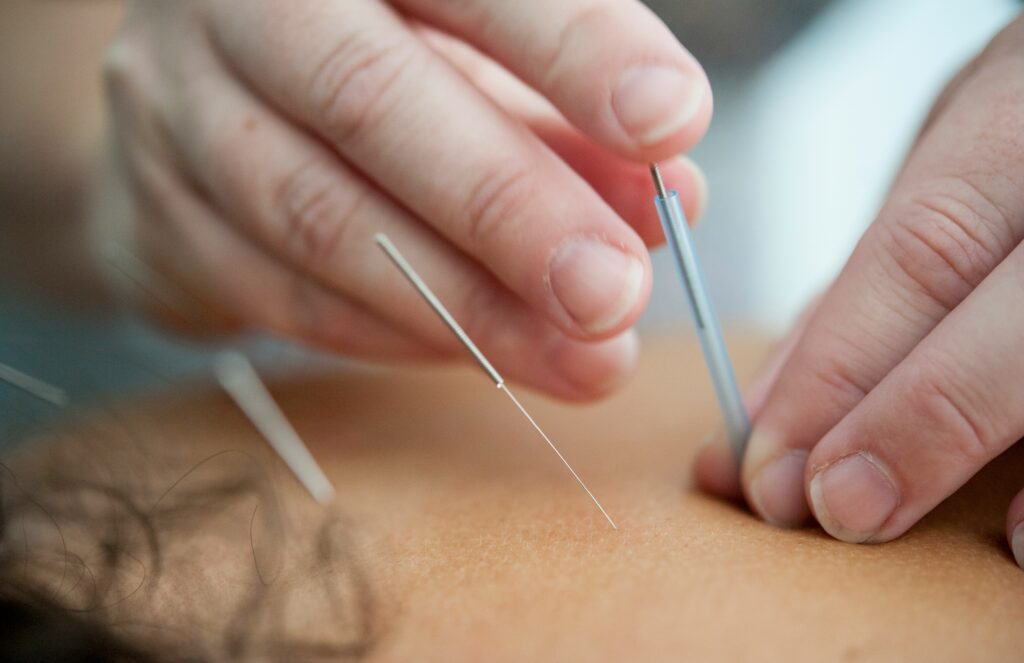David Foster
New York, New York, United States

Even as I spent hours every week sitting in lectures, plus hundreds of thousands of dollars on my Chinese medicine education, I still never figured that I would become an actual acupuncturist. I was a comedian, first and foremost. I had a decade of New York performances under my belt with around 4,000 shows, television appearances, contest victories, heartbreaks, and even a small amount of fame. Studying Chinese medicine was a fallback, I supposed, something I could do besides waiting tables or answering phones to pay the bills as I re-entered a financially difficult chapter of my career.
Many nights after class at 9 pm, I would hit the clubs in midtown for two or three spots, occasionally stealing a few minutes of study time by the bar for my quiz the next day on herbal pharmacology. Fellow comics assumed I was reviewing my set, refining my bits, and I played along, preferring to keep my alternate pursuit a secret from the world of nightlife warriors who might view any Plan B as symptomatic of cowardice. On average I was doing eight to ten shows per week, still smoking Newports, and going to sleep after 2am—not quite adhering to the Taoist principles being imparted to me in lectures by day. I was confident that I would realize success in comedy, so much so that I made a deal with myself: If school graduation came and went before I was back to making a living off of my passion as I had previously, I would make the pilgrimage west to Los Angeles.
I moved to Echo Park two months after graduation with only a duffle bag, my skateboard, and about $2,000. I spent most of my first six months getting on my feet, falling on my face, accumulating debt, and dealing with psychosomatic burnout. Without a license to practice acupuncture in Los Angeles, I waited tables, ironically, and performed on my nights off. I put in my time, endured daily rejection, both professionally and romantically, and midway through 2016, as a birthday present to myself, I conceded defeat and returned home to New York and Chinese medicine.
I quickly observed the many similarities between trying to cure patients and trying to rock crowds. In terms of yin and yang, they are both yang, which is to say the externally acting stimulant in the dynamic, as opposed to the passive recipient. I suppose I enjoy being the catalyst, he who might transform the minds or bodies of others, not necessarily for reasons of selflessness, though this is a heart-warming side effect. I truly love the two crafts. They excite me—performing for the adrenaline and satisfaction of killing, having successfully created something from only my mind and it being affirmed by perfect strangers within a context of the highest stakes and intensity; medicine for the intellectual challenge of physiological investigation, observing the results when the code is finally cracked, and the satisfaction of healing. Laughter might be “the best medicine” within the cabinet of human interactions, but even Richard Pryor could not have cured long Covid, chronic migraines, or depression. I have.
The concept of “blaming the crowd” was one of the first parallels I noted when I transitioned from performing into practice. Just as some comedy crowds are either too dim-witted or hyper-sensitive for certain jokes, patients’ bodies also run the gamut as far as how treatment is received. While some barely notice acupuncture is happening, others squirm and scream from even hair-thin needle sensations. Most fall somewhere in the middle.

Manual (needle) technique, like joke-writing, is something scholarly clinicians work hard on perfecting and take great pride in delivering smoothly. Early in my acupuncture career, when people reacted poorly to my needle insertions, “boo-hooing me” if you will, I felt triggered and insecure, invariably placed the blame on myself, and questioned whether I even possessed the potential to improve. With greater experience and growth, I am now able to better distinguish between instances of my own manual error versus those of hyper-reactive patients. With greater experience and growth, it is more often a case of the latter. The same is true for every comedian. After thousands of shows, we are less ruffled by certain bits not going over as well, and more astute at where to assign blame.
A similar analogy exists in the macrocosm of the patient/practitioner pursuit. I consistently question whether it is my imperfect treatments or a particular patient’s lack of self-care that keeps a full physiological resolution elusive in the puzzle of disease. For people who have no stress management, no exercise routine, and a poor diet and sleep habits, it is a challenge to obtain good clinical results. When they come back week after week and “heckle me” for a failure to improve, I might consider “snapping back,” inquiring how my prescriptions are supposed to cure their gut when ice cream and alcohol are working against them. As a comedian, I wanted to be as good as Pryor or Seinfeld—to write and deliver jokes cleverly enough that they could be equally appreciated by fools and geniuses alike. In medicine, I equally wish to get patients to the point where they can have their occasional indulgences and “live their lives,” as Americans characterize habitual self-destruction.
Trial and error are important aspects of both medicine and stand-up comedy. When comedians write a new bit, we try it out to see how it is received, then modify or expound upon it based on audience feedback. Similarly, when I encounter a patient with a difficult chronic condition, I write a prescription for an herbal formula, then based on their feedback I will change a few ingredients or the dosage. If their symptoms remain stubborn after a few courses of treatment, I must concede my formula to be wrong and go in another direction. I can recall countless instances of clinging on to a new joke through three, five, maybe ten attempts, changing the wording, maybe peppering with profanity for good measure, before finally accepting that it was just not funny.
As in the stand-up world, there is an arrogant elitism in the acupuncture community around who is practicing at a high level or even properly. They are the scholars of the medicine, critically thinking about every case the way our ancestors did, perpetually growing through their studies, versus those who are still doing the same lazy protocols we were taught in school, yielding temporary clinical results at best, giving the medicine an undeserving reputation as ineffective. Laypeople often stereotype acupuncturists as necessarily “zen” or spiritual—maybe we moonlight as yoga teachers, all speak in soft voices, and are followed everywhere we go by some floating essential oil diffuser. On the contrary, our great clinicians should be likened to the finest internists, without the same abbreviations after their names, but with equally as much education under their belts and inflation to their heads.
In comedy, if you got your laughs more from a big, flamboyant delivery than from clever writing, you were considered hokey. If you rehashed jokes based on cliche racial stereotypes or marital dynamics, you were hacky. If you were dirty for the sake of being dirty you were amateur, or just dumb. If you weren’t able to do crowd-work at all, your confidence might come under question, whereas if all you did was crowd-work you might get labeled a poor writer. Acupuncturists who don’t use guide tubes to insert their needles generally look down upon those who do. Those not properly trained in tongue or pulse diagnosis, those unfamiliar with the classical herbal texts, or who can’t identify which are the weak or affected muscles on an orthopedic patient are treated like joke thieves on the circuit—frauds who have no right being there. Worst of all, if you dare seek to prescribe herbs “allopathically,” which is to say in response to symptoms the way Western medicine does, you are guaranteed a lashing on Facebook groups the way a new comedian might if they said the wrong thing near the bar at the Comedy Cellar. To be honest, I never had the courage to go back there and say much at all, which is probably part of the reason why I ultimately failed. It took me forty years to gain the nerve to ask “stupid questions” to my contemporaries, for which I have been decidedly reprimanded for on occasion. But I lived. And I am better for it.
Both fields demand a great deal of humility in order to achieve greatness. Humility engenders infinite curiosity and diligence, which in turn engender wisdom. I don’t think I was humble enough as a comedian. I was kind to others and insecure at times, but I often wielded an unfounded sense of confidence that precluded me from being a truly perpetual student of the craft. Too often I blamed the crowd, the industry, or the girls in California. In Chinese medicine, I aspire to be better in this respect, always making the responsibility for clinical results my own, maybe even to a fault. Your doctor, no matter the medicine, should be like Seinfeld or Pryor: in perpetual search of mastery or perfection, skilled enough to know where to take risks, and humble enough to refine limitations in your best interest. Don’t interrupt. Let him finish his bit, do what he says. And if he falls flat, you fall flat together, and heckle him on your way out the door.
DAVID FOSTER is a recovering stand-up comedian, having appeared on HBO and MTV, in addition to touring the world, performing on major festivals and late-night TV in Holland. He is presently a board-certified acupuncturist and herbalist of Chinese medicine, runs his own private practice in New York City, and is a professor at Pacific College of Oriental Medicine.

Leave a Reply